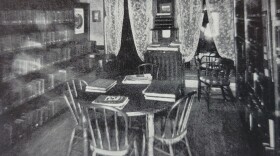Every vote counts, within the rules. In the Minocqua Town election of April 1912 the rules were a little blurry.
Around the turn of the century in the Northwoods, it was common practice for local candidates to cater to lumberjacks for votes. Many of these loggers came to the area only for the cutting season, traveling from their homes in other parts of the state, or country. Then returning after the spring thaw, or moving on to other camps or milltowns.
The spring elections often coincided with the cutting season, which meant more people at the polls. Candidates would entice lumberjacks with offers of drinks and cigars if they came to town to vote. This method of attracting votes was practiced by all the major political parties at the time.
In the Minocqua Town election of 1912, two of the losing candidates, Thomas M. Bolger, and William Small, saw a time and place to challenge this longstanding practice of transient lumberjack voting.
The two men brought legal action against their opponents, William Schlect, who had won the 1912 Town Chairman seat, and Theodore Bosacki, as Town Clerk. This litigation was part of a long running fight in the Town of Minoqua between two major political groups, the Bolger faction, and the Dorwin/Torpy's
A ruling was handed down by the Oneida County Courts in January of 1913, stating that temporary workers did not have the grounds to vote in local elections in the place they were working. The ruling however did not remove Bosacki or Schlect from office. The case was then taken to the Wisconsin Supreme Court.
The State Courts would not settle on a decision until October of 1913, stating that:
“Unmarried men, having no home except a logging camp where they do not intend to remain longer than their logging job lasts, have no place of residence in any legal acceptation of that term”
And that
“a person shall not be considered to have gained a residence in any town, ward, or village into which he shall have come for temporary purposes merely, men who went into a town in the fall of 1911 for the purpose of logging, intending to stay only until their job was finished or until camp should be broken the following spring, were not qualified electors at the town election held in April, 1912”
Over a dozen lumberjack votes were tossed out for the election of 1912, determining that at least Bosacki would have lost, the election being so close. By that time, the one-year terms of Town Clerk and Chairman had already ended and so the case set precedent only for future elections.
During the time the challenge had been moving through the courts, Theodore Bosacki had won a reelection for Town Clerk in the Spring 1913, and retained his seat.
The Wisconsin State Supreme Court decision cleared up the matter of lumberjack votes, and stopped the courting of transient workers in local elections, but in the end it did little to stop the political feuds in Minocqua between the Bolger camp, and the Dorwin/ Torpy Camp, that lasted well into the 1920s.
Sources:
STATE ex rel. SMALL v. BOSACKI. (Supreme Court of Wisconsin. Oct. 7, 1913.)
Various Wisconsin Newspaper Articles 1911-1914
Interview with Dan Scrobel, Minoqua Attorney and Historian









